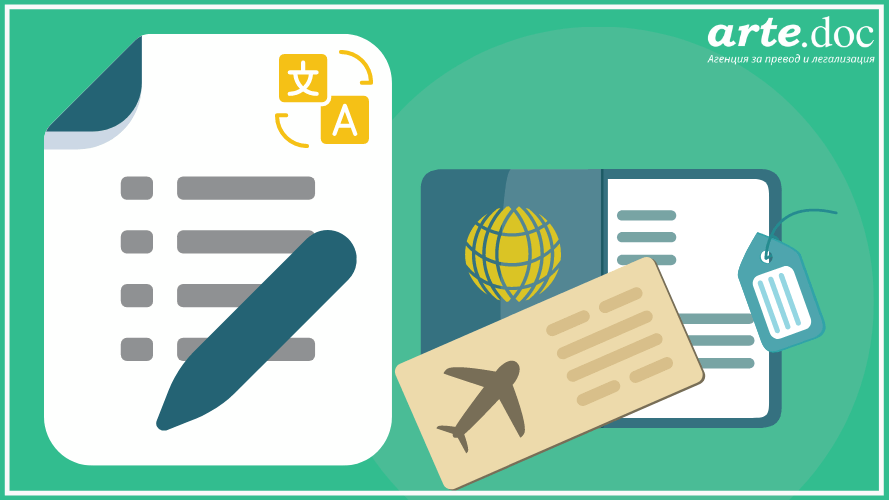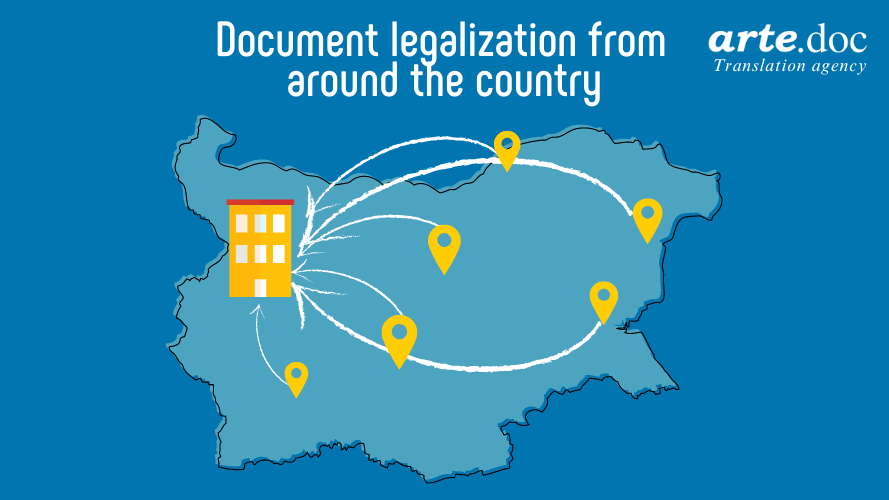
Where is an Apostille certificate recognized according to the Hague Convention?
Did you know that a stamp called an Apostille has the power to transform any document into an internationally recognized fact? This simple looking paper stamp is like a golden key in the world of international documentation that makes all sorts of legal, company and personal actions possible abroad.
In this article, we will explain to you what an Apostille is, when it is needed, what the Hague Convention is, why it is important, and in which countries the Apostille of your document will be recognized.
What is an Apostille certificate and for what documents is it required?
An Apostille is a rectangular paper stamp which certifies the origin of a public document. It is issued by an authorized body in the country where the document was issued.
The main purpose of the Apostille is to eliminate the need for additional legalization or certification when presenting documents in foreign countries. This simplifies the process and ensures that the validity of the document is recognized internationally.
An Apostille is needed for various types of documents.
Among them are the following:
- Personal documents: such as birth certificates, marriage certificates, etc.
- Legal documents: such as court decisions or documents issued by government agencies
- Notarized documents: such as powers of attorney
- Educational documents: such as diplomas and transcripts
- Trade-related documents: such as business contracts and articles of incorporation
The Apostille guarantees that these documents are exempt from any additional legalization, that they will have legal effects and will be accepted in countries that are parties to the Hague Convention, which facilitates citizens.
What is the Hague Convention and what are its purposes?
The Hague Convention, officially known as the "Hague Convention Abolishing the Requirement of Legalisation for Foreign Public Documents", is an international treaty, aiming to streamline the process concerning the legalization of documents, issued in one Member State and used in another.
The aim is to create a standardized method for authenticating public documents.
The main objectives of the Hague Convention are:
- Streamlined legalization: Eliminate the need for multiple levels of certification, including consular legalization, for foreign documents.
- Promoting efficiency: Simplify the process of international document recognition, making it more efficient for individuals and businesses.
- Reducing fraud: By providing a secure and standardized method of certifying documents through an Apostille, the Convention helps prevent document forgery and fraud.
Adopted on 5 October 1961, the Hague Convention introduced the concept of certification through an Apostille, which is recognized by State Parties as a universally accepted form of legalization and a means of certifying the legal effects of documents.
Countries that have signed the Hague Convention Abolishing the Requirement of Legalisation for Foreign Public Documents
The following is a comprehensive list of countries that have ratified the Hague Convention, which recognize the Apostille certification for foreign documents.
A
Albania
Andorra
Antigua and Barbuda
Argentina
Armenia
Australia
Austria
Azerbaijan
B
Bahamas
Bahrain
Barbados
Belarus
Belgium
Belize
Bolivia
Bosnia and Herzegovina
Botswana
Brazil
Brunei Darussalam
Bulgaria
Burundi
C
Cabo Verde
Canada
Chile
China
Colombia
Cook Islands
Costa Rica
Croatia
Cyprus
Czech Republic
D
Denmark
Dominica
Dominican Republic
E
Ecuador
El Salvador
Estonia
Eswatini
F
Fiji
Finland
France
G
Georgia
Germany
Greece
Grenada
Guatemala
Guyana
H
Honduras
Hungary
I
Iceland
India
Indonesia
Ireland
Israel
Italy
J
Japan
Jamaica
K
Kazakhstan
Kosovo
Kyrgyzstan
L
Latvia
Lesotho
Liberia
Liechtenstein
Lithuania
Luxembourg
M
Malawi
Malta
Marshall Islands
Mauritius
Mexico
Monaco
Mongolia
Montenegro
Morocco
N
Namibia
Netherlands
New Zealand
Nicaragua
Niue
North Macedonia
Norway
O
Oman
P
Pakistan
Palau
Panama
Paraguay
Peru
Philippines
Poland
Portugal
R
Republic of Korea
Republic of Moldova
Romania
Russian Federation
Rwanda
S
Saint Kitts and Nevis
Saint Lucia
Saint Vincent and the Grenadines
Samoa
San Marino
Sao Tome and Principe
Saudi Arabia
Senegal
Serbia
Seychelles
Singapore
Slovakia
Slovenia
South Africa
Spain
Suriname
Swaziland
Sweden
Switzerland
T
Tajikistan
Tonga
Trinidad and Tobago
Tunisia
Turkey
U
Ukraine
United Kingdom of Great Britain and Northern Ireland
United States of America
Uruguay
Uzbekistan
V
Vanuatu
Venezuela
This extensive list of countries that are parties to the Hague Apostille Convention, demonstrates the wide recognition of the certificate, making it the primary method of document authentication in many countries.
How to legalize translations of documents for countries not parties to the Hague Convention?
Although the Hague Convention has significantly simplified the legalization process for many countries, there are still countries, which have not become parties to the Convention and thus require additional steps for the legalization of documents.
In these cases, it is of utmost importance that you understand the specific requirements of each country.
There are countries with which the Republic of Bulgaria has concluded an agreement for legal assistance. If your document was issued by such a country and the agreement signed between the two countries explicitly mentions the exemption from legalization of documents, this document should "bear the relevant elements", according to the terms of the agreement.
For countries not parties to the Hague Convention and countries with which Bulgaria has not concluded an agreement for legal assistance, the process is very different and often involves a combination of different factors.
These may include:
- Notarization.
- Certification by the consular department of the country where the document was issued.
- Additional legalization by a diplomatic or consular representation of the country of destination (in some cases).
This process ensures that the document is authentic and is accepted as valid by the foreign jurisdiction.
Translation and legalization of documents
When you are in need of translation and legalization of personal or company documents issued in the Republic of Bulgaria and intended for use abroad, it is good to be familiar with several basic features of the process.
Here they are:
- Certification of documents with an Apostille: An Apostille is placed on the original document or on its copy. The price for an Apostille varies depending on the certifying institution.
- Sworn translator: Translations of documents intended for legalization need to be done by a sworn translator. The document is translated together with its accompanying Apostille.
- Legalization of translations: The finished translation, together with the originals, is submitted to the Consular Department of the Ministry of Foreign Affairs for certification of the translator's signature.
You can do steps 1 and 3 by yourself or choose to trust a professional translation agency for the entire process. This ensures that everything will be done professionally and in accordance with the legal requirements. It will also save you valuable time from going around offices and institutions.
As a translation agency with 25 years of leadership in the industry, we at Arte.Doc are well prepared to assist our clients in need of translation and legalization of documents.
Our team of experts understands the ins and outs of the process and provides a free 15-minute consultation where all the steps of the process for your specific document will be explained to you. Our professional sworn translators can provide you with quality language translations in 36 languages.
Whether you need a certification through an Apostille of a birth certificate or legalization of documents intended for countries not parties to the Hague Apostille Convention, we at Arte.Doc guarantee seamless international recognition of your important personal and company documents.

Frequently Asked Questions
- Where are documents with an Apostille legalized?
- Is there a need for legalization and an Apostille for documents in the European Union?
- Does the translation service include the price for the Apostille certification?
- Can a copy of a document be legalized with an Apostille after being certified by a notary public?
- When and why would a birth certificate be certified with an Apostille?
- Who and how can perform an Apostille certification in your absence? Is a power of attorney required?
 English (UK)
English (UK)  Български
Български 







 Only 18% of the population lives in Sofia but, like many other countries around the world, almost all institutions that certify and legalize documents are located in the capital city.
Only 18% of the population lives in Sofia but, like many other countries around the world, almost all institutions that certify and legalize documents are located in the capital city. 




